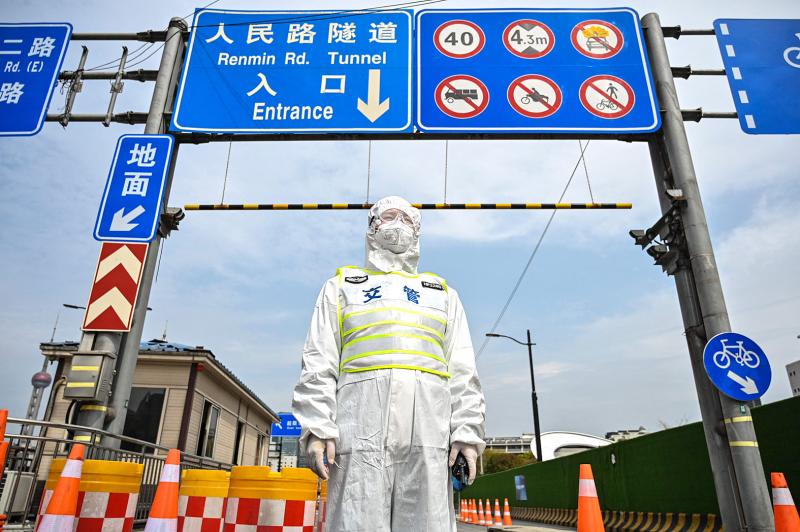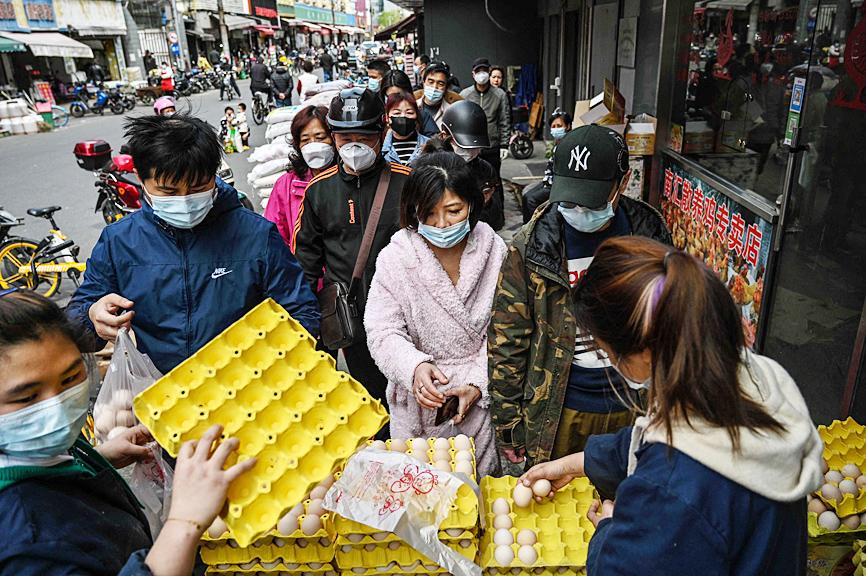Millions of people in Shanghai were yesterday confined to their homes as the eastern half of China’s financial hub went into lockdown to curb the country’s biggest ongoing COVID-19 outbreak.
The move, announced late on Sunday, caused a run on grocery stores by residents who have become exasperated with authorities’ inability to snuff out the outbreak despite nearly three weeks of increasingly disruptive measures.
Authorities are imposing a two-phase lockdown of the city of about 25 million people to carry out mass testing.

Photo: AFP
The government had sought to avoid the hard lockdowns regularly deployed in other Chinese cities, opting instead for rolling localized lockdowns to keep Shanghai’s economy running.
However, the city has in the past few weeks become China’s COVID-19 hot spot, and yesterday reported another record high, with 3,500 new confirmed cases.
The area locked down yesterday is the sprawling eastern district known as Pudong, which includes the main international airport and glittering financial center.

Photo: AFP
The lockdown is to last until Friday, then switch to the more populated western Puxi section, home to the historic Bund riverfront.
The government said the steps were intended to root out infections “as soon as possible.”
The unpredictable neighborhood-level measures employed in the past few weeks have left many citizens frustrated with repeated brief confinements at home.
Some complained that only several hours’ notice was given for the new, larger lockdown.
“We really don’t understand Shanghai’s management and control measures. There has indeed been some inconsistency,” said a 59-year-old man who gave only his surname Cao as he lined up to buy groceries.
“After so much time, [the city] is not controlling the virus and the numbers are still going up,” he added.
China largely kept the virus under control for the past two years through strict zero-tolerance measures including mass lockdowns of cities and provinces for even small numbers of cases.
The Omicron variant of SARS-CoV-2 has proven harder to stamp out.
China has reported several thousand new daily cases for the past two weeks. Those numbers remain insignificant globally, but are up sharply from fewer than 100 per day last month.
Tens of millions of residents in affected areas across China have been subjected to citywide lockdowns in response, but as Shanghai has struggled, some cities have made progress.
The southern tech manufacturing hub Shenzhen — which locked down earlier in the current outbreak — announced that normal business activity was resuming as new cases have fallen.
One Shanghai resident wrote on the popular Sina Weibo microblog of being in and out of neighborhood lockdowns several times recently.
“Now even peoples’ basic livelihood has become a problem. Those who aren’t locked down fight for food, and those who are sit up all night trying to order food on apps,” the post said.
Some posts complained of the effect on older residents who might not know how to order online, while others accused Shanghai — which is envied by other cities for its wealth and cosmopolitan image — of putting its desire to maintain normality over health concerns.
Chinese authorities have watched nervously as a deadly Hong Kong Omicron surge sparked panic buying and claimed a high toll of unvaccinated older residents before later surging in mainland China.

Australia has announced an agreement with the tiny Pacific nation Nauru enabling it to send hundreds of immigrants to the barren island. The deal affects more than 220 immigrants in Australia, including some convicted of serious crimes. Australian Minister of Home Affairs Tony Burke signed the memorandum of understanding on a visit to Nauru, the government said in a statement on Friday. “It contains undertakings for the proper treatment and long-term residence of people who have no legal right to stay in Australia, to be received in Nauru,” it said. “Australia will provide funding to underpin this arrangement and support Nauru’s long-term economic

‘NEO-NAZIS’: A minister described the rally as ‘spreading hate’ and ‘dividing our communities,’ adding that it had been organized and promoted by far-right groups Thousands of Australians joined anti-immigration rallies across the country yesterday that the center-left government condemned, saying they sought to spread hate and were linked to neo-Nazis. “March for Australia” rallies against immigration were held in Sydney, and other state capitals and regional centers, according to the group’s Web site. “Mass migration has torn at the bonds that held our communities together,” the Web site said. The group posted on X on Saturday that the rallies aimed to do “what the mainstream politicians never have the courage to do: demand an end to mass immigration.” The group also said it was concerned about culture,

ANGER: Unrest worsened after a taxi driver was killed by a police vehicle on Thursday, as protesters set alight government buildings across the nation Protests worsened overnight across major cities of Indonesia, far beyond the capital, Jakarta, as demonstrators defied Indonesian President Prabowo Subianto’s call for calm. The most serious unrest was seen in the eastern city of Makassar, while protests also unfolded in Bandung, Surabaya, Solo and Yogyakarta. By yesterday morning, crowds had dispersed in Jakarta. Troops patrolled the streets with tactical vehicles and helped civilians clear trash, although smoke was still rising in various protest sites. Three people died and five were injured in Makassar when protesters set fire to the regional parliament building during a plenary session on Friday evening, according to

CRACKDOWN: The Indonesian president vowed to clamp down on ‘treason and terrorism,’ while acceding to some protest demands to revoke lawmaker benefits Protests in Indonesia over rising living costs and inequality intensified overnight, prompting Indonesian President Prabowo Subianto to cancel a planned trip to China, while demonstrators reportedly targeted the homes of the finance minister and several lawmakers. Rioters entered Indonesian Minister of Finance Sri Mulyani Indrawati’s residence near Jakarta early yesterday, but were repelled by armed forces personnel, Kompas reported. Items were taken from the homes of lawmaker Ahmad Sahroni and two others, according to Detik.com. The reports of looting could not be independently verified, and the finance ministry has not responded to requests for comment. The protests were sparked by outrage over